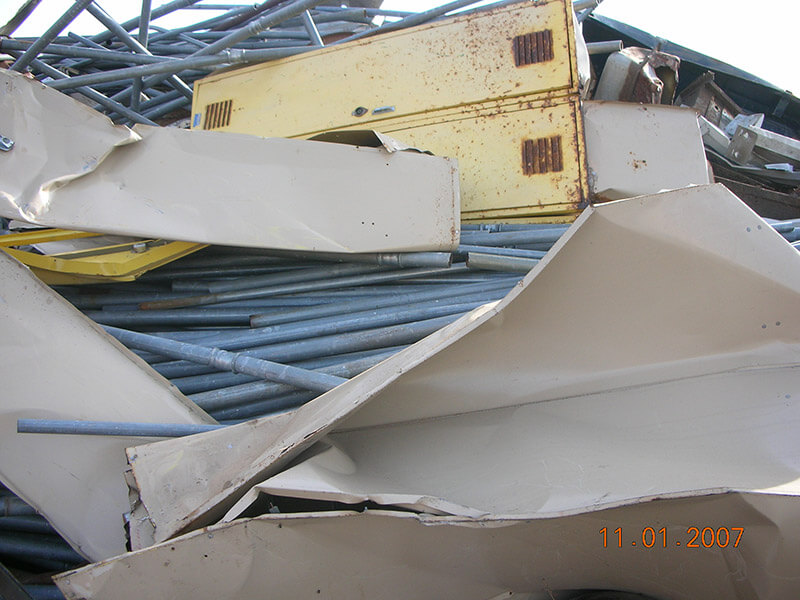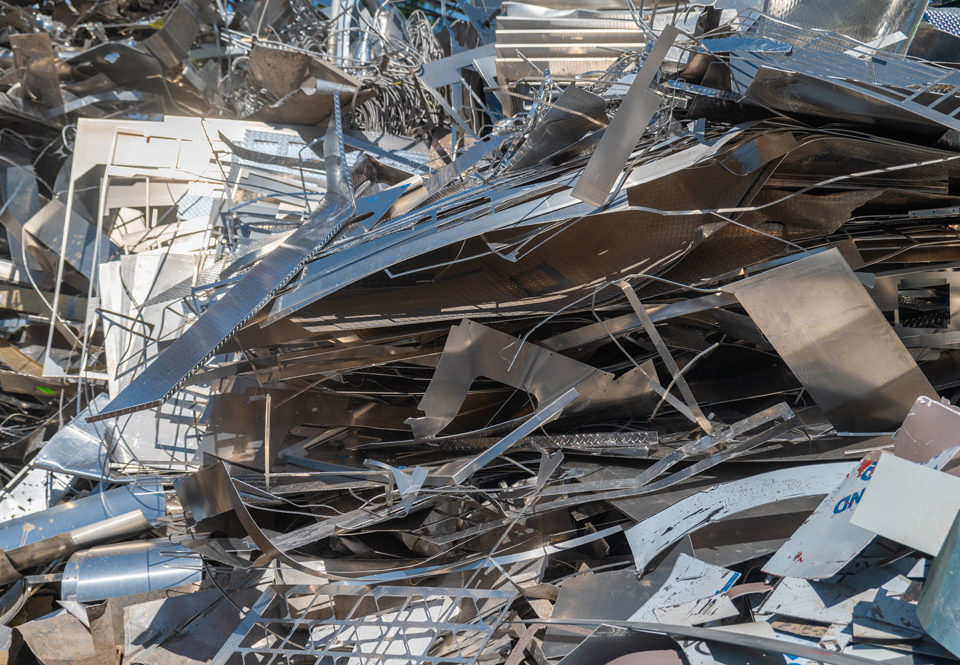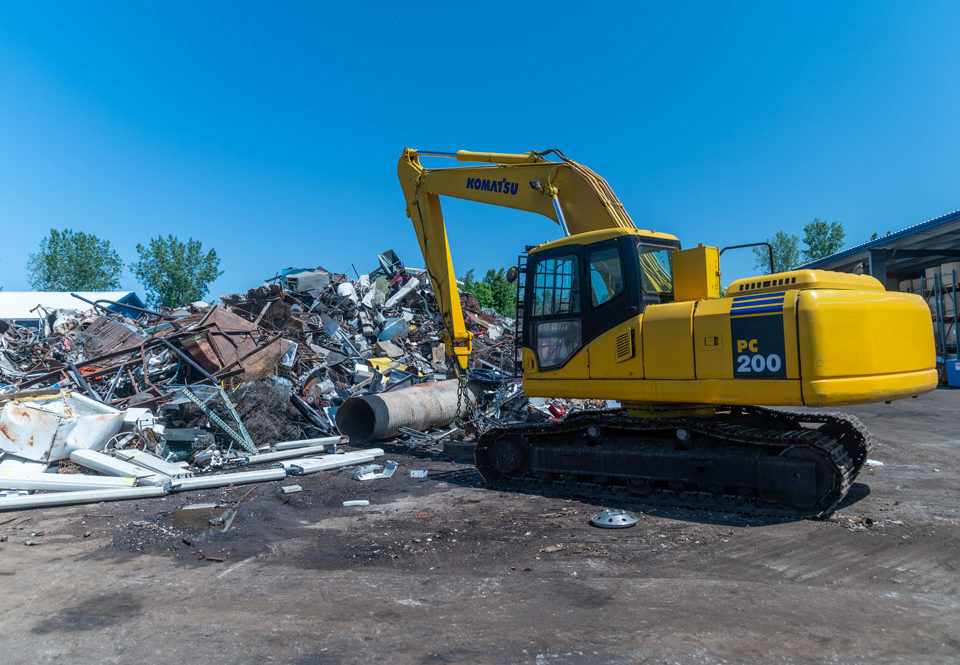
The need to manage industrial waste, mainly scrap metal, efficiently and responsibly has never been greater.
Today, we will help you understand how to classify metals and the different types.
We’ll also discuss some best practices to manage and dispose of scrap metal waste. This allows companies to maximize profits while also contributing to the sustainability of the environment.
Understanding Different Types Of Scrap Metal
Understanding the type of scrap metal generated by your industry is the first step to efficient scrap metal disposal.
Metals are divided into two categories: ferrous metals (such as steel, which contains iron) and nonferrous metals (such as copper, brass and stainless steel). The magnetic properties of ferrous metals make them easy to separate and identify.
Sorting and categorizing these metals properly will increase their efficiency in disposal. This makes it easier for recycling plants to process your scrap metal and can fetch you a higher price when selling it.
You can distinguish different metals based on their color, weight and other characteristics. Magnet and spark tests can also be used.
Here is a bit more information about the types of scrap metals that are most common.
Aluminum
This type of scrap is non-magnetic and light. Aluminum is easy to identify because of its dull finish. Aluminum is one of the most valuable types of scrap metal when it comes to recycling. It can often bring in more money than iron.
Copper
Copper has a reddish orange color and is heavier than aluminum. High conductivity and ductility make it highly desirable.
Brass
Brass is made of zinc and copper. It has a golden color. Brass can be identified by magnetism tests as it is non-ferrous, and therefore not attracted to magnetic fields.
Stainless Steel
Stainless steel has a high strength and durability. It is notable that it doesn’t corrode, and keeps its shape well. It is usually gray or silver and magnetic.
Implementing an Effective System for Scrap Metal Management
Let’s talk about how to create a management system that is effective.
In industrial settings, an effective scrap metal management is essential. It is important to have a separate storage area for each type of scrap metal. Implement inventory management and tracking practices to keep track of the types of scrap metal produced.
Audits and assessments help to identify areas for waste, inefficiency or improvement. This proactive approach maximizes efficiency, prevents regulatory issues, and maximizes value for your scrap metal.
Maximizing value through proper scrap metal handling
If you want the most bang for your dollar, it is important to handle scrap metal properly. Cleaning and sorting metals is important to make sure they are in marketable condition. This includes using the right tools and machinery to disassemble and transport scrap metals. Safety protocols, including the use of protective gear such as gloves and masks, are also important.
You should also keep abreast of any changes to the scrap metal markets and their prices. You can then adjust your scrap management system in order to get the best value from your scrap metals.
Methods of Responsible Disposal for Scrap Metal
We’ll then explore three primary methods of disposing scrap metals in industrial settings, to provide more sustainable solutions. These are: recycling, repurposing and donating.
Recycling
Recycling is the key to responsible scrap metal disposal. Recycling scrap metal involves a number of processes, such as melting and reshaping it, before it is turned into a new product.
Recycling has many benefits.
It is environmentally friendly because it reduces energy consumption, reduces demand for virgin metals (which are harmful to ecosystems) and conserves resources.
Recycling also helps to keep potentially hazardous materials from landfills and reduces pollution.
Recycling can also save industries money, as the revenue generated by selling recyclable scrap could be significant. Are you curious about what influences scrap metal prices and how they are determined?
Repurposing
Repurposing is another exciting, but often overlooked method of scrap metal disposal. This involves taking waste that would normally be considered and finding practical and innovative uses for it. In essence, repurposing breathes new life into scrap metal.
Donating
Another valuable way to dispose of scrap metal is through donation. Donating scrap metal helps reduce waste while also supporting a worthy cause. Scrap metal can be used in school projects, technical classes or for research. Local businesses and universities can also use it to repair or build things.
Many charities and non profit organizations also accept scrap metal donations to help fund their cause.
Working with Scrap Metal Recycling Facilities
A partnership with a reputable metal recycling facility will make the process of disposal easier. You must first know how to find a reputable recycler.
Search for a business that adheres to the highest standards of safety, health, and environmental protection. The company should have a perfect track record in terms of legal compliance. They should also be open and honest about their business practices, and ready to answer your questions.
Negotiate favorable terms with the recycling facility you have chosen.
You can use these tips to get the best deal.
- Learn what types of scrap metal are accepted and what they are worth.
- Consider obtaining discounts on larger scrap metal quantities.
- Compare prices at different recyclers to find the best deal.
- Verify that the recycler follows responsible recycling practices such as disposing of hazardous wastes and adhering to applicable regulations.
- Record your scrap metal purchases for future reference.
You should also explore partnership opportunities with recycling facilities.
Included in this list are:
- Sponsoring charitable events
- Donating scrap metals to local charities
- Collaboration with educational institutions for research projects
These initiatives are good for the environment, and they will also help your business to gain positive publicity.
Develop a culture of sustainability and waste reduction
Let’s now look at what you can to do create a culture of sustainability and waste reduction within your organization.
It is important to first understand the impact that your organization’s practices of scrap metal disposal have on the environment. Provide resources and information to managers and employees about the importance and benefits of scrap metal recycling.
Encourage employee participation in sustainable practice is another key step. You could hold competitions for employees who show green behaviors such as recycling waste metal more efficiently or avoiding unnecessary waste.
It is also important to create policies and procedures for the proper handling and disposal of scrap metal. It is important that the organization follows best practices in managing its resources.
Consider partnering with an established scrap metal recycler to help you better manage your waste. A good partner can not only offer quality service, but also provide guidance on how to reduce your scrap metal disposal cost while still doing the best thing for the environment.
FAQs: Top Tips on Efficient Disposal of Scrap Metal in Industrial Settings
Here are a couple of quick Q&As on the disposal of scrap metal!
What is the best scrap metal to sell?
Due to their high demand and usability, copper, brass and aluminum are the most valuable scraps. Copper is a valuable metal that’s used in many industries including plumbing, electrical work, construction and more.
How to properly dispose of metals?
Metal disposal involves sorting out and separating the different types of metals. They are then stored safely and can be recycled, repurposed, or donated through a facility or organization such as Scrap Gators.
Which appliance contains the most copper?
In the tubing and wiring of air conditioners and fridges, copper is often used.
Conclusion: Efficient Scrap Metal Disposal
We’ve seen that efficient scrap metal removal in industrial settings involves a multi-faceted process.
- What types of scrap metal are there?
- Implementing a management system that works
- Maximizing the value of your product through proper handling
- Utilizing responsible disposal methods
- Partnership with reputable recycling centers
- How to foster a culture of sustainable living
These tips and strategies will help industries to achieve cost-effectiveness and regulatory compliance while also preserving the environment.
We are committed to helping businesses with their scrap metal needs. For more information, contact us or browse our commercial scrap metal services available in the Twin Cities Area.


